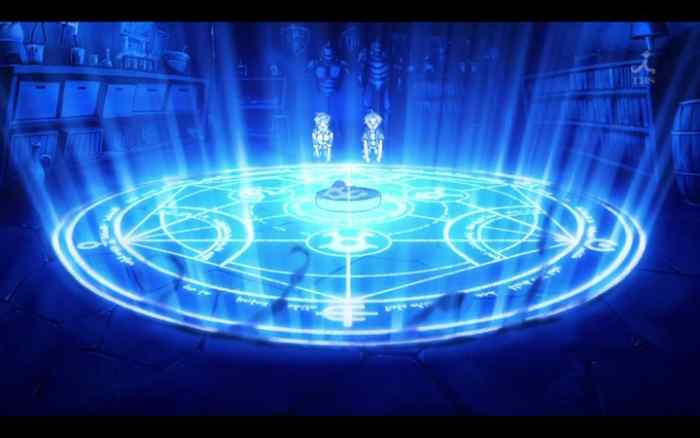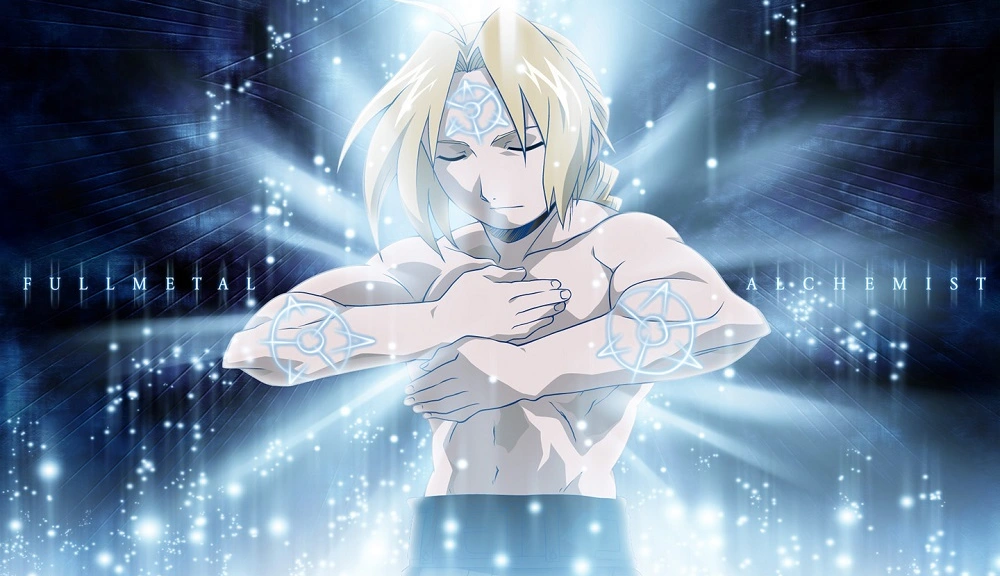
Note: this will contain LOTS of spoilers. And if you already know the story of FMA, feel free to skip to the section entitled “The Truth”.
Introduction
Fullmetal Alchemist, created by Hiromu Arakawa, is a great manga and anime for a few reasons:
1. Great character development. It’s hard not to feel for the characters in all of their struggles, hopes, triumphs, and defeats.
2. An exciting, elaborate plot, filled with complicated military strategies and rebellion, as well as a world of magic that could present a plot twist at any moment.
3. An incredibly realistic world, with scientific explanations for the “magic” upon which the series heavily focuses on. Not only are the scientific explanations, well, scientific, but even philosophical.
On that last remark of reason #3, we find why so many people appreciate Fullmetal Alchemist. It’s so philosophical in a way that touches the hearts of its viewers, encouraging and even enjoining them to contemplate the actions or principles of the main characters.
Hiromu Arakawa has created both a world and a group of characters that take on moral dilemmas and complex, ethically-blurry situations from a philosophical dimension. One of the most prominent philosophical themes/questions that Fullmetal Alchemist focuses on is that of Equivalent Exchange, or rather, as it is called most officially, “The Law of Equivalent Exchange”.
Alchemy and the Law of Equivalent Exchange

Alchemy is the type of “magic” used by “alchemists” in Fullmetal Alchemist. Actually, it’s a mixture of science, art, and magic. It’s not like the alchemy performed by the “pre-chemists” of Medieval times–although there is obviously a heavy relationship between the alchemy of history and alchemy of Arakawa’s world. Alchemy in Arakawa’s world is performed by first drawing a “transmutation circle”. The transmutation circle enables both the “alchemical power” of the earth and all matter to be harnessed and a manifestation of the alchemist’s transmutation to be formed. Once the transmutation circle is drawn, the matter or objects that the alchemist will use in his transmutation are placed within the circle. Next, three basic actions must be performed by the alchemist:
- The alchemist must understand the atomic or molecular structure of the matter in question.
- He or she must first use the alchemical power/transmutation circle to break down the matter.
- He or she forms something new from the broken down matter.
In other words, the three basic actions are Comprehension, Deconstruction and Reconstruction.
However, there are two “laws” that apply to alchemy, and ultimately to Equivalent Exchange. One of them is the Law of Mass Conservation, a law that exists in the real world, outside of the universe created by Arakawa. The Law of Mass Conservation, as it applies to alchemy, means that the amount of matter going into the transmutation will equal the amount of matter once the transmutation is finished. The second is the Law of Natural Providence, which means that if you are transmuting something made of steel, you can only produce something with the characteristics similar to steel; for instance, you couldn’t transmute steel and create water.
Both of these laws form the basis for the Law of Equivalent Exchange. Put simply, the Law of Equivalent Exchange states that:
In order to obtain something, something of equal value must be lost.
For instance, a transmutation cannot be performed if no matter is placed within the transmutation circle; the circle must be “given” the matter it will transform.
The Law of Equivalent Exchange relates directly to alchemy; it is seemingly a scientific principle of the alchemical arts. However, in Fullmetal Alchemist, Edward and Alphonse (Ed and Al) take Equivalent Exchange further and (in a most philosophical manner) seek to apply it as a moral code: a principle to be followed in the face of every complexity and endeavor a person could work through and towards. Thus, Equivalent Exchange is applied to actions. Many would agree that, perhaps, this “law” certainly makes sense. Equivalent Exchange technically states that if you want something, you need to put in the necessary amount of effort to get what you want.
That makes sense, right?
The Taboo and the Quest
Ed and Al fail to apply the Law of Equivalent Exchange when they try to resurrect their mother. At this point in their lives, Ed and Al are only children, and–having been abandoned by their father–their mother meant everything to them. After their mother dies, the brothers begin studying alchemy in earnest in order to learn how to perform a Human Transmutation. However, Human Transmutation is strictly forbidden by every alchemical authority; it is impossible to accomplish, and extremely dangerous. You cannot resurrect someone from the dead.
Ed and Al are reckless, however. They will try to bring back their mother no matter what. They gather every elemental component of the human body, and then each of them contribute a drop of blood. Thus, the brothers believe that they themselves will lose nothing as a result of Equivalent Exchange; they have provided the means to make a body (via the elemental components), and their drops of blood are for creating their mother’s soul.
Try as they might, two drops of blood don’t equal the value of a human soul. The transmutation fails, and Edward’s leg is taken from him as Equivalent Exchange tries to make up for creating a human soul. Alphonse loses his entire person. Shocked by their failure, Edward quickly sacrifices his arm and manages to bring back Alphonse’s soul and bind it to a suit of armor. It would seem like, after the transmutation, Edward and Alphonse have given so much to resurrect their mother. Surely they have given enough to bring her back.
Unfortunately, they are rewarded with a creature that isn’t even human.

The plot of Fullmetal Alchemist then becomes Ed and Al searching for ways to fix their bodies. Ed has vowed to return Al’s soul to his body, and Ed would also like to get his arm and leg back. Both of them understand that fixing their bodies will require another Human Transmutation. But, egged-on by stories of the legendary Philosopher’s Stone, a super alchemical-amplifier, they believe that returning to their bodies is still possible. Ed and Al still believe that if they sacrifice enough, if they try hard enough and put enough effort into their quest, they will be rewarded in the end.
The Truth

Although the general plot is the same as Arakawa’s manga adaption of Fullmetal Alchemist, the anime Fullmetal Alchemist, which aired between 2003 and 2004, mostly contains episodes that are different from Arakawa’s original story-line. This version of Fullmetal Alchemist, in spite of how it lacks authenticity in its relation to Arakawa’s version of the story, heavily focuses on the internal and emotional struggles of Edward and Alphonse, as well as the credibility of the Law of Equivalent Exchange.
The anime Fullmetal Alchemist displays Ed and Al’s quest not only as an adventure, but a search to discover the truth–the truth about alchemy and the Law of Equivalent Exchange. Ed and Al have religiously believed in the laws of alchemy, and especially in Equivalent Exchange. As stated previously, the brothers believe that if they give enough effort to their quest, they will succeed in the end. According to the Elrics, that’s how life works; if you persevere and work hard, it will pay off. It’s Equivalent Exchange.
It’s hard to ignore the fact that there is a certain beauty to the Law of Equivalent Exchange, if it is indeed real. In the anime Fullmetal Alchemist, it’s difficult not to identify with the reasoning of Ed and Al (but specifically Ed). The Law of Equivalent Exchange makes every action that we take towards a certain goal worth something. There is also a beautiful sense of simplicity in regards to the logic of Equivalent Exchange. Edward seems especially connected to this part of Equivalent Exchange; the peace and confidence of mind that comes with knowing that he’ll be rewarded for all of his struggles. The audience of Fullmetal Alchemist finds themselves hoping that Ed and Al are right; hopefully, Equivalent Exchange is real.

The truth about Equivalent Exchange finally comes to light when Ed confronts Dante, the main antagonist of Fullmetal Alchemist. Dante is a powerful alchemist that has survived for centuries, using the power of the Philosopher’s Stone to transport her soul into a new body each time she starts growing old. However, as Ed points out, every time she “jumps” bodies, she loses a part of herself through Equivalent Exchange. As a result, her soul can’t remain in the bodies she uses for very long.
But then Dante replies: Equivalence? Don’t tell me you still believe in that naive theory.
And the following discussion ensues…
Ed: It’s no theory! It’s the absolute law of alchemy! No, of the whole world! To obtain anything, something of equal value must be lost. You couldn’t have gotten anywhere without knowing that.
Dante: A beautiful story, told to the oppressed and to make children do their lessons. The truth is, the Law of Equivalent Exchange is a lie.
Ed: Impossible!
Dante: “To gain, something of equal value must be lost”; conversely, if you give something up you will always gain a prize of equal worth in return.
Ed: Exactly. That’s why people work hard at anything they do, because it pays off.
Dante: Wrong. People work because they believe it will pay, but “equal effort” doesn’t always mean “equal gain”.
Ed: …Like what?
Dante: Consider the State Alchemy exam, which you passed with flying colors. How many others took the test that day, spent months, years preparing, some working much harder than you, but you were the only one who passed? Where was their reward? Was it their fault that they lacked your natural talent?
(Later in conversation) Dante: People can say there’s a balance, a logic that everything happens for a reason, but the truth is far less designed. No matter how hard you work, when you die, you die. Some spend their lives trying to scratch their way to the top, but still live in poverty, while others are born into wealth without ever working at all. It’s a cruel and random world, and yet the chaos is all so beautiful.
And their debate ends there. Ed doesn’t seem entirely convinced with Dante’s reasoning. But he’s obviously discouraged, able to think of no reply to Dante. He can see the truth in her words. No argument is needed to reaffirm Dante’s words. Equivalent Exchange, it seems, has been proven wrong.
Faith

An episode later, Edward is once again told that Equivalent Exchange isn’t real, this time by his own father, Hoenheim. Hoenheim leaves without giving Edward an opportunity to argue, but as Ed watches his father leaves, we hear his thoughts, cast out to Hoenheim and the audience.
Ed: I can’t agree with you. I know that if I try my hardest, I’ll be rewarded, and I believe that applies to all of us. It doesn’t matter who you are. If you work hard, it pays off. I know Equivalent Exchange is true.
And, as if he can hear Ed’s thoughts, Hoenheim replies mentally: But this world…
Ed: If it’s childish to believe in this, so be it. I’d rather be a child than follow a doctorate of cynicism and chaos…apathy. I thought that I didn’t care, Dad–that I didn’t need to believe in things. But I was wrong.
It is interesting to note that now we have a popular contradiction, insofar as recognizing Truth goes. Hoenheim and Dante both believe that Equivalent Exchange isn’t real. Their argument is based on reason. Edward’s argument is a bit more personal, but still authentic all the same. Ed’s argument is based on faith.

When it comes to dying in the 2003-2004 Fullmetal Alchemist, things can get a little complicated. In order to complete this discussion, I need to lay out, in an orderly fashion, what happens:
- Edward is sent by Dante over into our world through “The Gate of Truth”. He has an alternate-self living in London during World War I. He, as his alternate-self, dies when a German zeppelin crashes.
- As a result, Ed comes back into the world of Fullmetal Alchemist as himself. However, he is soon after killed by the Homonculus Envy. Ordinarily, he would go back into our world to his alternate-self…but his alternate-self has already died. Thus, Ed will seemingly really die.
- But then Alphonse, who’s been turned into a Philosopher Stone himself, sacrifices himself in an effort to bring Edward back. He is successful; in this case, Equivalent Exchange prevails, since a life is traded for a life.
- Once Edward returns, he immediately proceeds to drag Alphonse back, body and soul, as an eleven year-old boy. And from this action the ultimate fulfillment of Equivalent Exchange occurs.
Edward should’ve died. Having sacrificed himself for Alphonse, and having no alternate-self to go to once beyond the Gate of Truth, it is seemingly impossible for Ed to survive. But then he finds himself back in London, as himself, with his father once again. And Edward is, rightfully so, confused. Why did he survive? He traded a life for a life. Why is he still alive?
It is Ed’s father, who, having rebuffed the notion of Equivalent Exchange earlier, provides an answer for Edward.
You boys had a long journey. All the people you helped along the way, all the hardships, the pain of losing friends you loved, the determination, sweat, blood…don’t you think that might’ve been the price you paid?
And so it seems that, in the end, Equivalent Exchange really came through for Edward after all.
The Answer
Is Equivalent Exchange real? Reasonably speaking, no. Unfortunately, the world just doesn’t work that way. However, it is definitely good when we are able to work for something, and be rewarded in the end. Perhaps it is straight-up idealism, and perhaps belief in Equivalent Exchange is childish, but it is a “law” to be respected, and in some cases, encouraged. To believe in Equivalent Exchange requires faith…even if you’re an agnostic, science-loving, 4’11 alchemist!
I guess I don’t really have an answer. What do you think?
Stay awesome,
Dominic (Aul)

Interesting look into Fullmetal Alchemist.
LikeLiked by 1 person
I know, it was kind of a “geek-out” moment. But thanks!
LikeLiked by 1 person
one of these days I am going to watch this. one of these days…your excellent analysis pushed it higher in my “watch queue”
LikeLiked by 1 person
Hahaha why thank you. Yes, you should definitely consider watching it. It’s an excellent show!
LikeLiked by 1 person
You’re welcome 🙂 I will eventually. I just have no time to watch anything thanks to job, work and all the other mundanities that come with being an adult.
LikeLiked by 1 person
That makes perfect sense of course! 🙂
LikeLiked by 1 person
🙂
LikeLike
I, as many other people like myself, like the idea very much but we cannot argue with reason. Reason dictates that it’s astronomically hard and pointless to make this principle exclusively possible…even for a being or beings highly powerful enough to do it. Life contains too many variables that are interacting to each other randomly to be able to control and direct them in such a simple matter. Maybe, if there are such beings, they are able to do so, but this “show” (life on Earth rule exclusively by this principle) would be too boring for them. Chaos is so fun that it can corrupt even them.
LikeLiked by 1 person
Sure, it’s certainly no “law”. But it’s still a good way to view life; even if it has a few flaws, it’s a good principle to live by.
Thanks for stopping by!
LikeLike
Great analysis! That was fun to read.
After you broke alchemy down as “Comprehension, Deconstruction and Reconstruction,” I couldn’t help thinking of reading as a type of alchemy, as these three concepts are important parts of text interpretation. The exchange: time for knowledge.
Reading also follows the rules you point out:
1. The reader must understand the structures of texts that they encounter.
2. He or she must first read the text and break it down to understand it
3. He or she synthesizes the information to form something new from the broken down text.
I think that Equivalent Exchange exists in different forms in real life. There is the literal exchange that works similar to the science of alchemy: one thing for another of obvious equal worth. This can be money for goods, or effort/time for a desired outcome.
Sometimes, however, I think that the exchange is a little more subtle, and relies more on Ed’s faith-based philosophy. When a person dies, you might ask, “where was the exchange in that?” The exchange is in having been alive. When a person spends hours sculpting a beautiful bowl and it explodes in the kiln, the exchange is in the experience gained. When a forest grows for centuries only to be destroyed by a fire, the exchange is one life period for another. A new forest or ecosystem will be able to grow in the aftermath. And when a person works hard, becomes wealthy, and loses it all, the exchange is in gaining a new type of life experience. If they do not have faith in this exchange, they may fall into despair and question why something so horrible happened after they worked so hard.
LikeLiked by 1 person
Wow!!! I love your take on this. Thanks for such a well-thought response.
That was beautifully put, you totally summed everything up from a faith point of view! You’re so right, when you look at it that way, equivalent exchange can be seen in so many things. In part, you basically just said “view everything that happens with a positive attitude!” Which is awesome!
Thanks for the response! I love FMA 😀
LikeLiked by 1 person